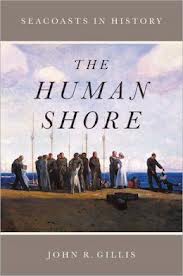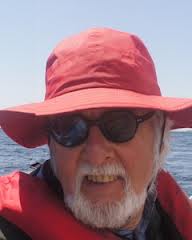Who wants a new “blue humanities” history of the West? I do!
I started this book just as the lights went out during Hurricane Sandy, and I was so enthralled I kept reading by flashlight for a few hours. The latest work of oceanic history by John Gillis, The Human Shore moves away from the islomania of his previous book, Islands of the Mind.
 This new book is, as the title suggests, more human and coastal. Gillis begins his “alternative account of global history” (4) with the claim that human societies emerged and thrived across the littoral, taking advantage of the complex and fecund ecotones between land and sea. “Shores,” he writes, “were humankind’s first Eden” (38). Tracing the migratory patterns of early human history that follows the “kelp highway” (24) from Asia into North America and using the knowledge gained by recent work in “wet archeology” (28) that has found in now-flooded terrain evidence of ancient human habitations, this new history is “more amphibious than aquatic” (39) as it clearly traces humankind’s ancient debt to the sea.
This new book is, as the title suggests, more human and coastal. Gillis begins his “alternative account of global history” (4) with the claim that human societies emerged and thrived across the littoral, taking advantage of the complex and fecund ecotones between land and sea. “Shores,” he writes, “were humankind’s first Eden” (38). Tracing the migratory patterns of early human history that follows the “kelp highway” (24) from Asia into North America and using the knowledge gained by recent work in “wet archeology” (28) that has found in now-flooded terrain evidence of ancient human habitations, this new history is “more amphibious than aquatic” (39) as it clearly traces humankind’s ancient debt to the sea.
A key distinction Gillis makes is the difference between living with and living on the coasts (98). To live on the coast means attempting to impose human structures and habits upon an unruly space; the day I started reading The Human Shore, my childhood haunts on the Jersey shore learned how transitory beach houses really are as huge waves rolled through their porches onto the streets behind. Living with coastal space, by contrast, might entail more temporary dwellings; a Times editorial soon after the storm that I can’t find right now emphasized that Native Americans hadn’t built permanent settlements on the barrier islands of New Jersey, though they did live there seasonally. These less heavy-footprinted practice amounts to a different attitude toward oceanic spaces —
Those who have learned to live with as opposed to just on coasts know that it is folly to believe that they are wholly in control of their own destiny. There are not fatalists, but they are respectful of tides and currents that set the tempo and scale of their world. In this respect, they are still like ancient foragers, more gamekeepers than the gardeners who regard it as their destiny to transform nature. (98)
The book narrates the histories of amphibious cultures from Vikings to Polynesian navigator to the Phonecians and the Malay “sea-gypsies.” It tells a story of the “second discovery of the sea” after the Romantic era, when Thoreau began calling the beach the “best natural place on earth” (172) and writers from Byron to Melville to Whitman and Dickinson hymn its sublime alterity. At times I though Gillis was more convinced that I am by W. H. Auden’s claim that Romanticism invented the modern sea, a claim that Jonathan Raban swallows whole in his oft-cited introduction to The Oxford Book of the Sea. Without minimizing the continuing force of the Romantic revolt, these writers no more invented the sea than Shakespeare, Lucretius, or Stephen Greenblatt invented the human.
I’m intrigued by the two-step process Gillis sees in our modern encounters with the sea, as “most Americans and Europeans became less physicall connected to the oceans…[but also] became more intimate with them mentally” (133). I think about this as a shift from a sailing culture, which relied on wind-born ships to enmesh local and global economies, to a swimming culture, in which the individual’s primary connections to the ocean are intimate, personal, and immersive. I’ve got an essay forthcoming on “Swimmer Poetics” that traces some of the implications of that contrast, and I’ve got more coming on that front.
This book ends with a rousing call to “abandon traditional blue-water assumptions that the oceans are elemental and timeless, and adapt what might be called a brown-water acknowledgment of the dynamic hybrid nature of our coastal water worlds” (198). Having recent written about “brown ecology” in another forthcoming essay, for Jeffrey Cohen’s Prismatic Ecologies collection, I’m right with him here, though I also think a place remains for blue as the color of our watery globe.
It’s an exciting time to be working in the blue humanities, and I’m glad John Gillis is sailing in these waters. We spent some time together a few years back at a great conference he co-organized on maritime environmental history, which is generating a book that got me thinking about eco-heroism. My son Ian & I also spent a glorious afternoon with him on Great Gott Island off the coast of Maine in 2011. I love his littoral move in The Human Shore, and look forward to its influence on the oceanic humanities in many forms.
Leave a Reply